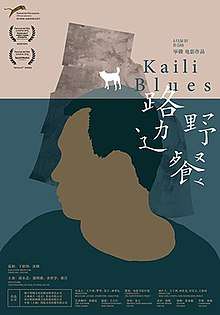Kaili Blues
Kaili Blues (simplified Chinese: 路边野餐; traditional Chinese: 路邊野餐) is a 2015 Chinese film written and directed by Bi Gan.
| Kaili Blues | |
|---|---|
 Film poster | |
| Traditional | 路邊野餐 |
| Simplified | 路边野餐 |
| Directed by | Bi Gan |
| Written by | Bi Gan |
Release date |
|
Running time | 113 minutes |
| Country | China |
| Language | Mandarin |
Plot
Ex-convict Chen Sheng works as a doctor in a rural community. Chen squabbles with his half-brother Crazy Face about how he neglects his son Weiwei. When Weiwei disappears, Chen believes that Crazy Face may have sold the child into servitude. Chen sets out to Zhenyuan to get Weiwei back. Chen drifts into a mysterious village called Dangmai, in which the past, present, and future mix together.
Production
Most of the cast members are local residents who were nonprofessional actors. Bi incorporated the actors' real lives when developing their characters. The lead character Chen Sheng is portrayed by Bi's uncle Chen Yongzhong, who like the character is a former gangster.[1][2]
Bi primarily filmed Kaili Blues in his hometown of Kaili City. The scenes in Dangmai were shot in the nearby village of Ping Liang. The film's budget was exhausted after completing the 41-minute long take of Dangmai. To finish the film, Bi assembled a small team to shoot the rest of the film using a portable Blackmagic Pocket Cinema Camera.[2]
Bi originally proposed the title Huang ran lu, after Portuguese author Fernando Pessoa's novel The Book of Disquiet. However, it was rejected as being too downbeat.[3] The film's Chinese title comes from the Strugatsky brothers' novel Roadside Picnic, which Tarkovsky adapted into the 1979 film Stalker.[4]
Release
Kaili Blues premiered on August 11, 2015 at the 68th Locarno Festival.[5] During its opening weekend, it grossed 4.49 million yuan.[6] It went on to gross 6.46 million yuan in China.[7]
The film won the Best Emerging Director prize at Locarno,[8] the Best New Film Director award at the 52nd Golden Horse Awards.[9] and the Golden Montgolfiere Prize at the 37th Three Continents Festival in Nantes.[10]
References
- Hoberman, J. (May 19, 2016). "A New Language for Chinese Film". The New York Review of Books. Retrieved May 7, 2020.
- Stewart, Aaron (May 27, 2016). "Interview: Director Bi Gan Talks 'Kaili Blues,' The Influence Of Tarkovsky, Sleeping Through Movies & More". The Playlist. Retrieved May 7, 2020.
- Kraicer, Shelly (2015). "Kaili Blues (Bi Gan, China)". Cinema Scope. No. 65. Retrieved May 7, 2020.
- Xiao, Jiwei; Andrew, Dudley. "Poetics and the Periphery: The Journey of Kaili Blues". Cineaste. Vol. 44 no. 3. Retrieved May 7, 2020.
- Wong, Edward (August 14, 2015). "Chinese Independent Filmmakers Look to Locarno Festival". The New York Times. Retrieved May 7, 2020.
- Wei, Xi (July 24, 2016). "'Kaili Blues' reveals a new approach for art films". Global Times. Retrieved May 7, 2020.
- Wei, Xi (January 3, 2019). "Campaign for Bi Gan's latest film leads to backlash from audiences". Global Times. Retrieved May 7, 2020.
- "Palmarès 2015". Locarno Festival. 2015. Retrieved May 7, 2020.
- "台北金馬影展" [Taipei Golden Horse Film Festival] (in Chinese). Golden Horse Film Festival and Awards. Retrieved May 7, 2020.
- "Kaili Blues". Three Continents Festival. Retrieved May 7, 2020.
External links
- Kaili Blues at Grasshopper Film
- Kaili Blues on IMDb
- Kaili Blues at AllMovie
- Kaili Blues at Metacritic
- Kaili Blues at Rotten Tomatoes